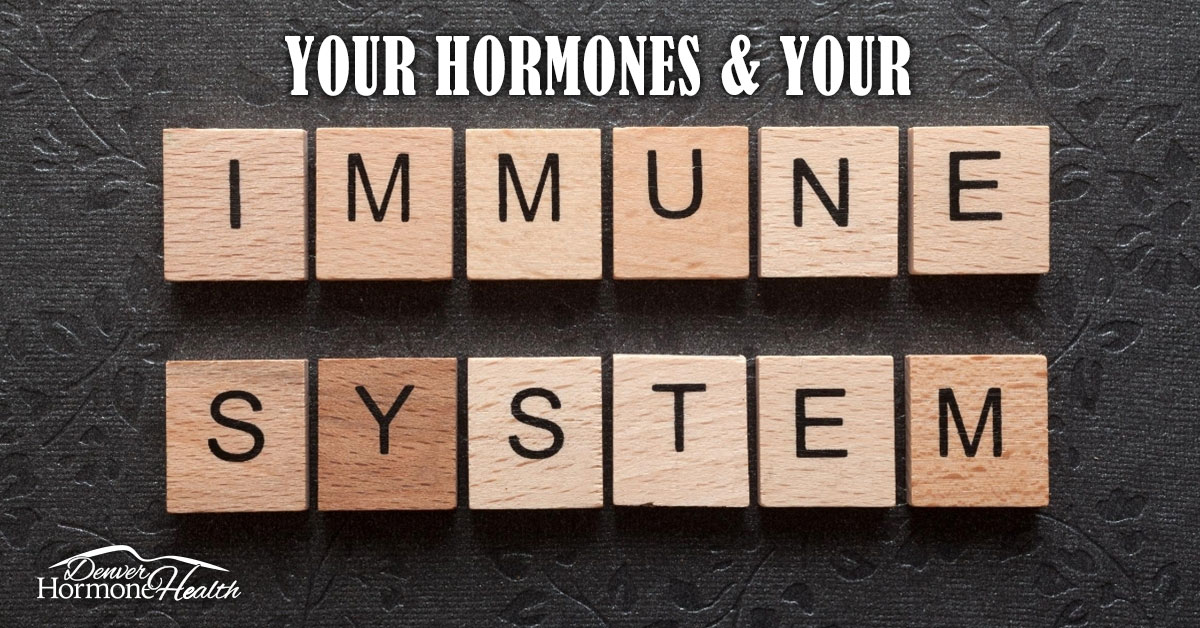A CRASH COURSE IN HORMONES AND YOUR IMMUNE SYSTEM

NO ONE’S IMMUNE TO WHAT’S GOING ON
It’s a good bet that pretty much everyone is concerned about that corona virus lurking out there ready to take on anyone who comes in its path. So what do you do? Wash hands? Check. Social distance? Check. Wear mask? Always. Keep immune system strong? What? The immune system. You’ve probably heard the phrase, but usually associated with seniors who are most at risk because their immune systems aren’t as strong as they should be. And while it’s true that as we age, our immune response capability becomes reduced, the real truth is that immune strength can be compromised at any age. So everyone’s at risk.
THE IMMUNE SYSTEM; PROMISING TO SERVE AND PROTECT
So what, exactly, is the immune system? The primary purpose of your immune system is to protect against pesky pathogens like bacteria, fungi, worms, and yep, viruses. Bug bad guys that want nothing more than to attack your body, breaking it down to make it more susceptible to injury and illness. Your immune system is the bouncer for what gets in and what stays out of your body. When it is working, the viruses and toxins don’t have a chance. When it’s not, the floodgates are wide open.
THE ONE-TWO PUNCH
Just to up your immune system knowledge a notch, there are actually two subsystems within the immune system, known as the innate (non-specific) immune system and the adaptive (specific) immune system. Both of these subsystems are closely linked and work together whenever a germ or harmful substance triggers an immune response.
The innate immune system provides a general defense against harmful germs and substances using immune cells such as natural killer cells and phagocytes (“eating cells”) to fight harmful substances that enter the body.
The adaptive (specific) immune system makes antibodies and uses them to specifically fight certain germs that the body has previously come into contact with. Because the adaptive immune system is constantly learning and adapting, the body can also fight bacteria or viruses that change over time.
THE BIG “D”
Ah, vitamin D, the Sunshine Vitamin. You get the rays, you get the D’s. Most people think vitamin D is mostly about strong teeth and healthy bones. But take notes here; One of the main functions of vitamin D is to help activate T cells, aka the “killer cells” in the body. T cells actually detect and destroy foreign pathogens — like viruses. “That makes vitamin D especially crucial for maintaining a functioning immune system that’s capable of fighting back foreign pathogens. And take note of this; Vitamin D insufficiency affects almost 50% of the population worldwide. On a last note, vitamin D is actually a hormone. Huh? Along with vitamin K, it is one of the only two vitamins/hormones produced by the body. More on hormones and the immune system in a minute. So keep reading.
NICE, BUT NOT ENOUGH
Basking in the sun (hopefully with a significantly high SPF) can get you a little D. Supplements a bit more. But neither is going to make a serious dent in boosting your immune health. So what else might help? Getting a good night’s sleep? Always a good idea. Eating right? When is that ever not good. Moving your body? Couldn’t hurt. Easing up on the stress? Are you kidding? Really? Now? The point is, while all these things can’t hurt your health, they really can’t do the work your immune system needs to stay strong.
HORMONES AND THE IMMUNE SYSTEM’ TIME TO BRING IN THE HEAVY ARTILLERY
Now we’re at the part where you put down your latte (or bag of Doritos) and really pay attention. Hormones have everything do to with immune health. When they’re in balance, they bolster our immune system like a suit of armor. When the body’s hormones are either too high, or too low, the immune system can be adversely impacted. Low thyroid levels can hamper the body’s response to viruses, and also cause a sluggish response to inflammation. Extremely high or low estrogen levels affect immunity. Low levels of progesterone have been linked to some autoimmune diseases. The adrenal glands which produce hormones like cortisol, play an important regulatory role in the immune response. So when the adrenals are fatigued, decreased adrenal hormone production may contribute to decreased immune function, with consequent increased susceptibility to infectious illness. Balanced hormones are the best ammo in better immune function. The problem (as if you don’t have enough already) is that very few people actually know if their hormones are balanced.
NEVER LET YOUR DEFENSES DOWN
It’s never been more important than now to find out if your hormones are out of balance. We know it can all seem a bit overwhelming (understatement anyone?). But we can make it simple for you. The hormone specialists at Denver Hormone Health know everything there is to know about hormones. And their highly trained professionals are experts in treating every type of hormone issue than can be caused by hormone imbalances. At Denver Hormone Health, they understand what it’s like to wonder if your immune system can put up a battle against what’s lurking out there. Including the novel coronavirus. With advanced screening, they can determine if your hormones are, in fact, out of balance. (Most peoples are). These tests allow them to target which hormones need balancing which allows them to create an individualized treatment plan uniquely designed to keep your immune system going strong. Call or text Denver Hormone Health now. Time to put the gloves on.
